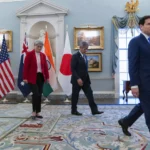
This Saturday, December 9, in Tucumán the Pride March will be held again, called at 4 p.m. to march from the Bicentennial Monument to Plaza Independencia, in defense of the rights already won and stepping strong one day before the inauguration of the future government of Freedom Advances.
The result of the ballot was the winner of the presidential candidacy of Javier Milei, far-right, reactionary and staunch enemy of women and sexual dissidents. A triumph that in part responds to the deep discontent towards the outgoing Unión Por la Patria government, which ends its mandate with very high unemployment numbers and 6 out of 10 children below the poverty line. This political event boosted hate speech as well as the questioning of the most basic rights of dissidents. The national situation must find the LGBTIQ+ community at the time of day, resuming with more force the discussion of not only celebrating our conquests, but also the need to turn this march into a forceful political message in accordance with the historical traditions of struggle. .
To the streets
The fights of LGBTIQ+ people in our country in the last period have been marked by great coordination and presence in the streets, with the achievements of pioneering laws in Latin America, such as the right to Equal Marriage, Gender Identity, the repeal of the Contraventional Codes (which explicitly criminalized transvestites and homosexuals) and the fight for the Transvestite-Trans Labor Quota. Like the women’s movement (with whom it constantly converges), which has waged great battles historically, whose strength and organizational capacity was recently demonstrated in the conquest of the Right to Safe and Free Legal Abortion, even with strong sectors of traditional politics and the ecclesiastical leaders against.
In recent years, progressive governments have sought to limit combativity with institutionalization through the State, as the only (illusory) guarantee of “sustaining” these conquests. Faced with this, it is important to put ourselves on alert to re-articulate organizational spaces in an independent way, fighting to dismantle the idea that the rights achieved are immovable and guaranteed. We see this in the province when the Jaldo government is already passing the chainsaw and organizations such as the Secretariat for Women and Diversity, intended to address cases of gender violence, are in danger. It also becomes more than necessary in the face of the right-wing advance that a La Libertad Avanza government means.
But then, if examples are enough where equality before the law is not equality before life, who should dissidents rely on to plot their definitive liberation? and under what horizon?
We never start from scratch
The last century has left great experiences in the fight for the liberation of gender and sexuality. In our country, a generation inspired by the Latin American experience of the Cuban Revolution, which also experienced the tides of revolutions and processes of mass uprisings at an international level, opened a process of radicalization in 1969 in Cordobazo, with a deep feeling in anti-imperialism and anti-capitalism. Despite the limits of the time, repression and censorship, a sector of the homosexual community, with a militant history linked to leftist ideas, formed the Homosexual Liberation Front (FLH) in 1971. In his short career, he was not limited only to an unrestricted defense of basic democratic rights, such as not being repressed or detained for sexuality.
Intimately linked to the international climate of the time, the French May, the black power and the women’s liberation movement, the FLH also in an advanced way, stated in its manifesto: “As we have attempted to demonstrate throughout this document, this Persecution has a purely political root. Sex itself is a political issue. To that extent, the liberation that we postulate cannot take place within an economic system of domination, such as Argentine dependent capitalism. But starting from our own marginalization, questioning sexist society from there, we arrive at a global questioning of society.”

At the same time, in France the Homosexual Front for Revolutionary Action (FHAR) was born, pulsating alongside the radicalization of students and workers, with revolts and takeovers of factories, which opened in May 1968.
In part, this front was born as a reaction to the orientation of associations such as Arcadie, for whom “homosexuals” could obtain a place in society by integrating into the upper classes and becoming “respectable.” This strategy ultimately turned out to be a great failure, in the extent to which he failed to overcome the repression of the Gaullist State.In July 1960, the Mirguet amendment condemned public indecency and included homosexuality among the “social scourges” along with alcoholism and tuberculosis.

There is a common lesson in these two examples to consider, perhaps more developed in the FHAR: integration into capitalist society will not emancipate us.
Facing what is coming: organization
Milei’s program is openly a declaration of war against LGBTIQ+ people, women and the working class, from its economic plan under the boot of the IMF without touching the pockets of businessmen, to with a strong ideological weight in misogynistic ideas and retrograde. Faced with the possible patriarchal reaction with attacks on important achievements of rights, the dissidents must not only resume the discussions linked to their emancipation, against their oppression and exploitation, but they must immediately think about their intervention in the political scene, not fighting on their own. isolated, but united with the different sectors of the working class, such as the precarious teachers of the ENIA plan (for the prevention of unintentional pregnancy), the different health sectors articulated in the fight for legal abortion, the women’s movement and different sectors in struggle, also twisting the arm of passivity imposed by union bureaucracies and student centers, to strike with a single fist.
Source: www.laizquierdadiario.com

